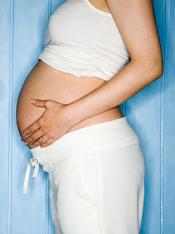The surrogate does all the heavy lifting. It's time we paid her
By Donna Webeck,
Daily Life [Australia]
| 07. 28. 2016
Renee Golland, a mother of three, is no stranger to surrogacy. She knows firsthand both the blessing and the burden being pregnant with another couple's child can bring. And while helping those who were unable to conceive their own baby gave her great joy, there's no denying the fact pregnancy comes with many risks. It's why Renee is calling for a change to Australia's surrogacy laws. She wants to see the switch from altruistic surrogacy (where the birth mother can only claim pregnancy related expenses) to legalising compensated surrogacy (currently known as commercial surrogacy, where the birth mother is paid for being a surrogate). Because right now the largest responsibility in this entire process lies with the surrogate - to grow and birth a healthy baby for someone else - yet they are not one who gains financially.
"There is no doubt there is money to be made from surrogacy," Renee stated in a recent parliamentary inquiry into this often misunderstood subject. "Usually the clinics, lawyers and counsellors are the beneficiaries of this. But not the surrogate - the woman...
Related Articles
By Julia Métraux, Mother Jones | 02.10.2026
Why was Jeffrey Epstein obsessed with genes? In the latest tranche of Epstein records and emails made available by the Department of Justice, themes of genes, genetics, and IQ—alongside more explicit threads of white supremacy—keep cropping up, often adjacent to Epstein’s...
By Teddy Rosenbluth, The New York Times | 02.09.2026
Dr. Mehmet Oz has urged Americans to get vaccinated against measles, one of the strongest endorsements of the vaccine yet from a top health official in the Trump administration, which has repeatedly undermined confidence in vaccine safety.
Dr. Oz, the...
By Ava Kofman, The New Yorker | 02.09.2026
1. The Surrogates
In the delicate jargon of the fertility industry, a woman who carries a child for someone else is said to be going on a “journey.” Kayla Elliott began hers in February, 2024, not long after she posted...
By Alex Polyakov, The Conversation | 02.09.2026
Prospective parents are being marketed genetic tests that claim to predict which IVF embryo will grow into the tallest, smartest or healthiest child.
But these tests cannot deliver what they promise. The benefits are likely minimal, while the risks to...




